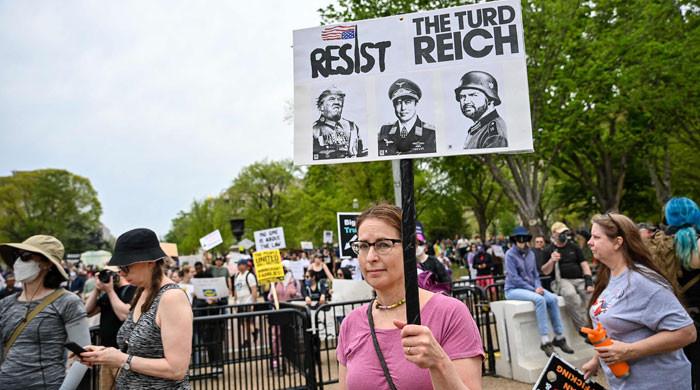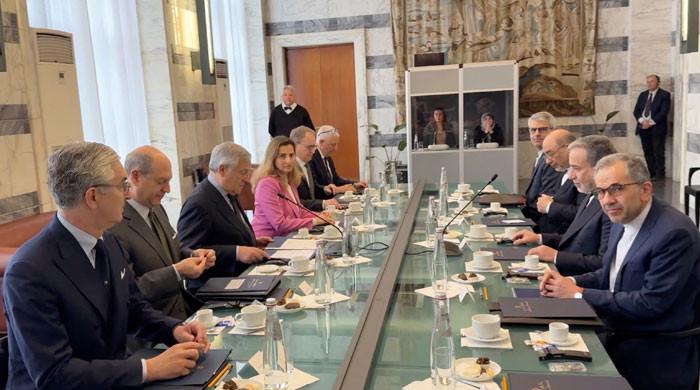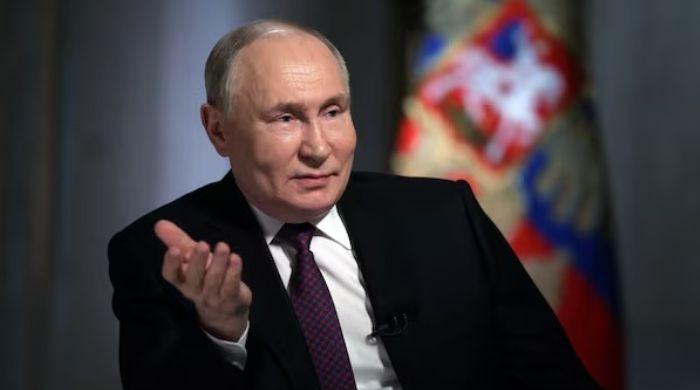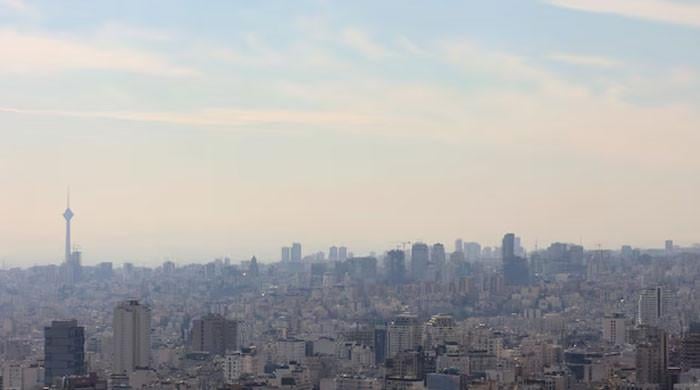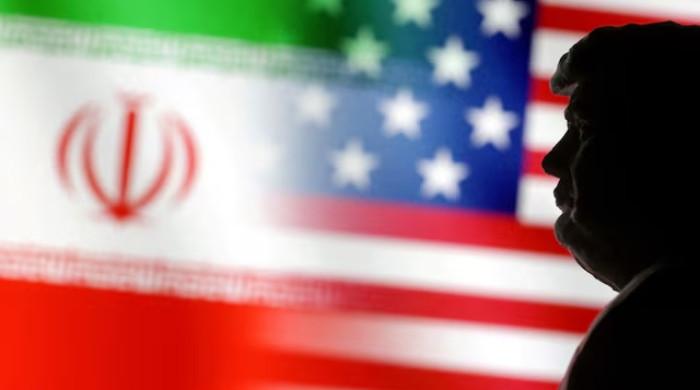Saudi oil attack: Evidence points to use of Iran weapons, says alliance
Iran denied US accusations it was to blame and said it was ready for “full-fledged war”
September 16, 2019
DUBAI: An attack on Saudi Arabia that triggered the biggest jump in oil prices in almost 30 years was carried out with Iranian weapons, a Saudi-led coalition said on Monday, as President Donald Trump said Washington was “locked and loaded” to hit back.
The Iran-aligned Houthi group that controls Yemen’s capital claimed responsibility for the attack, which knocked out more than half of Saudi Arabia’s oil production and damaged the world’s biggest crude processing plant.
Iran denied US accusations it was to blame and said it was ready for “full-fledged war”.
Two sources briefed on state oil company Saudi Aramco’s operations told Reuters it might take months for Saudi oil production to return to normal. Earlier estimates had suggested it could take weeks.
A Saudi-led military alliance battling the Houthis said the attack on Saudi oil plants was done with Iranian weapons and was not launched from Yemen, according to preliminary findings.
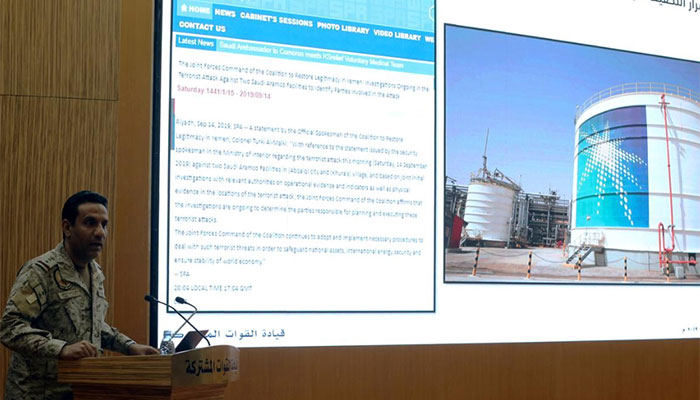
Coalition spokesman Colonel Turki al-Malki said that an investigation into Saturday’s strikes, which shut 5% of world crude output, was going on to determine the launch location.
“The preliminary results show that the weapons are Iranian and we are currently working to determine the location ... The terrorist attack did not originate from Yemen as the Houthi militia claimed,” Malki told a press conference in Riyadh.
UN Yemen envoy Martin Griffiths told the Security Council on Monday it was “not entirely clear” who was behind the strike but he said it had increased the chances of a regional conflict.
But US Ambassador to the world body, Kelly Craft, told the Council that emerging information on the attacks “indicates that responsibility lies with Iran” and that there is no evidence the attack came from Yemen.
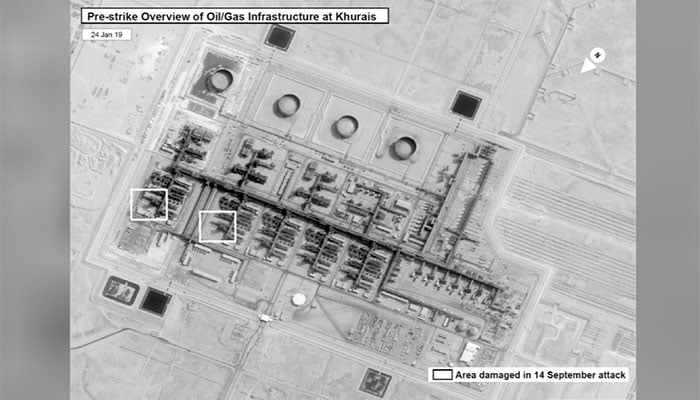
US will ´defend´ international order being ´undermined by Iran´: Pentagon chief
US Defense Secretary Mike Esper said Monday that the US military is preparing a response to the attack on a major Saudi Arabia oil refinery.
After briefing President Donald Trump in the White House, Esper singled out Iran as undermining international order, without directly pinning blame on Tehran for the attack.
"The United States military, with our interagency team, is working with our partners to address this unprecedented attack and defend the international rules-based order that is being undermined by Iran," he said in a tweet.
Oil prices surge
Iran has dismissed as “unacceptable” US accusations that Tehran was responsible.
Oil prices surged by as much as 19% before coming off their peaks. The intraday jump was the biggest since the 1990-91 Gulf crisis over Iraq’s invasion of Kuwait.
US blames Iran
Prices eased after Trump announced that he would release US emergency supplies and producers said there were enough stocks stored up worldwide to make up for the shortfall. But traders still spoke of a long-term price increase as markets absorb the proof that global supply can be so sharply hit.
“There is reason to believe that we know the culprit, are locked and loaded depending on verification, but are waiting to hear from the Kingdom as to who they believe was the cause of this attack, and under what terms we would proceed!” Trump said on Twitter on Sunday.
US Energy Secretary Rick Perry pinned the blame squarely on Iran for “an attack on the global economy and the global energy market”.
“The United States wholeheartedly condemns Iran’s attack on Saudi Arabia and we call on other nations to do the same,” he said in a speech to an annual meeting in Vienna of the UN nuclear watchdog IAEA. He added that he was confident the oil market “is resilient and will respond positively”.
Houthis threaten more attacks
While Iran has denied blame for the attacks, its Yemeni allies have promised more strikes to come. Houthi military spokesman Yahya Sarea said the group carried out Saturday’s pre-dawn attack with drones, including some powered by jet engines.
“We assure the Saudi regime that our long arm can reach any place we choose and at the time of our choosing,” Sarea tweeted. “We warn companies and foreigners against being near the plants that we struck because they are still in our sights and could be hit at any moment.”
US officials say they believe that the attacks came from the opposite direction, possibly from Iran itself rather than Yemen, and may have involved cruise missiles. Wherever the attacks were launched, however, they believe Iran is to blame.
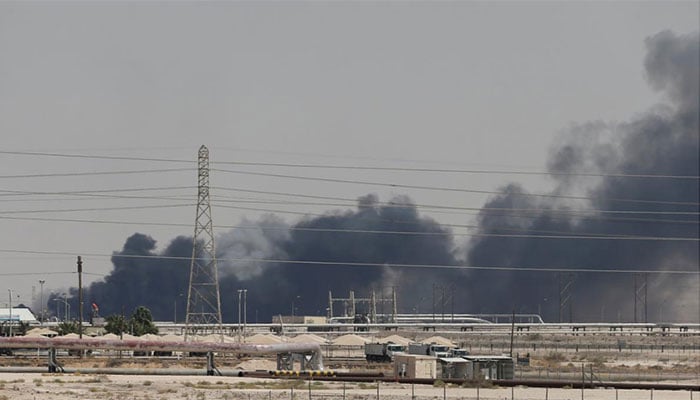
“There’s no doubt that Iran is responsible for this. No matter how you slice it, there’s no escaping it. There’s no other candidate,” a US official said on Sunday.
Saudi Arabia and Iran have been enemies for decades and are fighting a number of proxy wars, including in Yemen where Saudi forces have been fighting against the Houthis for four years.
Tension in the oil-producing Gulf region has dramatically escalated this year after Trump imposed severe US sanctions on Iran aimed at halting its oil exports altogether.
IPO in trouble?
The attack is a major test for Saudi Arabia as it could dampen investor confidence in Aramco´s upcoming two-stage initial public offering (IPO), a mammoth listing that the government hopes will generate up to $100 billion.
Saudi authorities are considering whether to delay an IPO for the oil giant, people with knowledge of the matter said.
"They´re in the process of assessing the damage. It´s a possibility but it´s still very early," said one of the sources who spoke on condition of anonymity.
The IPO, earlier scheduled for 2018, has already been mired in delays as it reportedly struggled to reach a $2 trillion valuation desired by Saudi rulers.
Saudi authorities have sought to calm jittery markets, with the Energy Intelligence specialist newsletter citing industry sources as saying Aramco was "close to restoring as much as 40 percent" of the lost production, or about 2.3 million barrels per day (bdp).
The Wall Street Journal cited people familiar with the damage estimates as saying the targeted facilities would take weeks to return to full production capacity.
The real extent of the damage at the facilities however remains unclear.
All eyes are on official word from the Saudis on the situation, which could offer reassurance to world markets.





